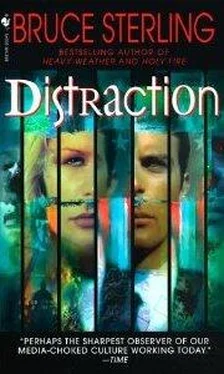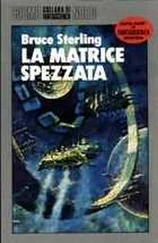Or so it seemed. It was still too early to tell whether the Presi-dent’s CDIA would have any staying power as a New Model Army. But the mere threat of its deployment sent a shock wave through the system. A new era was clearly at hand. America’s Emergency was truly and finally over. The War was on.
Oscar followed these developments with great professional care, and reacted to catch the popular tide. He had Greta formally declare the Emergency over at the Collaboratory. There was no more Emer-gency. From now on, it was Wartime.
“Why are you doing this to us?” Greta demanded, in yet another bone-grinding late-night committee session. “What possible differ-ence does it make?”
“It makes all the difference in the world.”
“But it’s all semantic! We’re all the same people. I’m still the lab Director, God help me. And we still have the Emergency Committee as the only people who can run this mess.”
“From now on, we’re the War Committee.”
“It’s just symbolic!”
“No it isn’t.” Oscar sighed. “I’ll explain it to you, very simply. The President has seized power in a time of crisis. He bypassed the Constitution, he undercut the Congress, he annihilated the Emer-gency committees. He did that by recruiting large gangs of organized social outcasts, who derive their new legitimacy strictly from him, and are loyal to him personally.”
“Yes, Oscar, we know all that. We’re not blind. And I’m very unhappy about what the President did. I certainly don’t see why we have to imitate his radical, bully-boy tactics.”
“Greta, the President is imitating us. That is exactly what we did, right here. The President is doing it because you and I got away with doing it! You’re very popular because you did that, you’re famous. People think it’s exciting to seize power with prole gangs, and to throw all the rascals out. It’s a very slick move.”
Greta was very troubled. “Oh… Oh my God.”
“I admit, this isn’t great news for American democracy. In fact, it’s bad news. It’s terrible news. It might even be catastrophic news. But it’s wonderful news for the lab. This news means that we’re all much, much less likely to get arrested or indicted for what we’ve done here. You see? We’re going to get away with it. It’s a wonderful political gift from our chief protector and patron — the President. We’re home free! All we have to do from now on is change our shirt whenever the President changes his shirt. From now on, we have protective color-ation. We’re no longer crazy radicals, on strike at a federal lab. We’re loyal citizens who are fully and mindfully engaged in the grand exper-iment of our President’s new social order. So from now on, that’s why we’re the War Committee.”
“But we can’t be the War Committee. We don’t have our own war.”
“Oh yes, we do.”
“No, we don’t.”
“Just wait.”
* * *
Two days later the President sent federal troops to Buna. The U.S. Army was finally responding to his orders, despite their deep institutional distaste for coercive violence against American citizens. Unfor-tunately, these soldiers were a marching battalion of Special Operations/Low-Intensity Conflict specialists.
The American military, at the historical tag end of traditional armed conflict, knew that they had entered an era where the pen truly was mightier than the sword. The sword just wasn’t much use in an epoch when battlefronts no longer existed and a standing army could be torn to shreds by cheap unmanned machinery.
So, the U.S. m.ilitary had downgraded their swords and upgraded their pens. The President’s U.S. Army Seventy-sixth Infowar and So-cial Adjudication Battalion were basically social workers. They wore crisp white uniforms, and concentrated on language skills, disaster re-lief measures, stress counseling, light police work, and first aid. Half of them were women, none of them had firearms, and, as a final fillip, they had been ordered into action without any federal funding. In fact, they were already four months behind on their salaries. They’d had to sell their armored personnel carriers just to make ends meet.
The Collaboratory was now seriously overcrowded. Poaching and eating the rare animals became a commonplace misdemeanor. With a battalion of five hundred mooching soldier/psychoanalysts, plus their camp-follower media coverage, the long-suffering Col-laboratory was seriously overloaded. The interior of the dome began to fog over with human breath.
To keep the newcomers usefully occupied, Oscar deputized the Infowar Battalion to psychologically besiege Huey’s loyalists, who were still stubbornly on strike, holed up in the Spinoffs building. They did this with a will. But the Collaboratory was beginning to resemble a giant subway.
The ideal solution was to build more shelter. The Moderators, in uneasy symbiosis with the feds, set up tents on the Collaboratory’s spare ground outside the dome. Oscar would have liked to build an-nexes to the Collaboratory. Bambakias’s emergency design plans sug-gested some quite astonishing methods by which this might be done. The materials were available. Manpower was in generous supply. The will to do it was present.
But there was no money. The Collaboratory was surrounded by the city of Buna, and its privately owned real estate. The city of Buna was still on friendly terms with the lab, even proud of them for having won so much publicity lately. But the lab couldn’t commandeer the city by force of arms. Besides, all of Buna’s available rental shelter had already been taken, on exorbitant terms, by European and Asian me-dia crews, and nongovernmental civil-rights and peace organizations.
So they were stymied. It always boiled down to money. They just didn’t have any. They had proved that the business of science could run on sheer charisma for a while, a life powered by sheer sense of wonder, like some endless pledge drive. But people were still peo-ple; they ran out of charisma, and the sense of wonder ate its young. The need for money was always serious, and always there.
Tempers frayed. Despite the utter harmlessness of the federal SO/ LIC troops, Huey correctly took their presence on the border of Lou-isiana as a menacing provocation. He unleashed a barrage of hysterical propaganda, including the bizarre, and documented, allegation that the President was a long-time Dutch agent. As Governor, and as a timber businessman, the President had had extensive dealings with the Dutch, during happier times. Huey’s oppo-research people had com-piled painstaking dossiers to this effect.
It didn’t matter. Only a schizoid with a case of bicameral con-sciousness could seriously contend that the President was a Dutch agent, when the President had just declared War on Holland. When the U.S. Navy was steaming for Amsterdam. When the Dutch were screaming for help, and getting none.
This spy allegation not only went nowhere, it convinced many former fence-sitters that Huey had utterly lost his mind. Huey was dangerous, and had to be pried from public office at all costs. And yet Huey held on, publicly drilling his state militia, conducting purges of his faltering police, swearing vengeance on a world of hypocrites and liars.
Oscar and Greta had reached the end of their rope. They began to argue seriously and publicly. They had had tiffs before, spats before, little misunderstandings; but after so many hours, days, weeks of diffi-cult administration work, they began to have bruising public combats over the future of the lab, over the meaning of their effort.
The end of the Emergency and the beginning of the War neces-sitated the creation of yet another media environment. Oscar shut down the public loudspeakers that monitored Emergency Committee discussions. Wartime was about loose lips sinking ships, about blood, sweat, toil, and tears. It was time to stop propagandizing the people of the Collaboratory. They already knew where they stood and what was at stake. Now they had to defend what they had built; they should be in the trenches with shovels, they should be singing marching songs.
Читать дальше




